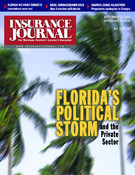As Florida insurance agents adjust to serious competition from the public sector, the Florida Association of Independent Agents has established a new staff position to act as a liaison between agents and state-backed Citizens Property Insurance Corp.
Jeff Grady, president of FAIA, said the organization’s biggest challenge is to avoid — at all cost — making independent insurance agents “wards of the state” when it comes to writing properties.
“That is not the business we want to be in,” Grady said. “So we’ve been developing some material for agents to basically sell against Citizens.”
Grady said the Citizens process is complex and produces inordinate amounts of paperwork. There can be as many as four technical bulletins a week.
According to Grady, dealing with non-renewals and the pricing and coverage concerns of the voluntary market is challenging enough. Now agents have people who read something about Citizens’ policies showing up at their doors and saying, “I need that policy.”
Grady told a group at the Demotech/Insurance Journal Florida Private Sector Summit in Orlando last month that securing private coverage for clients when everyone is being told that the public insurer Citizens is the answer and has the lowest price is a tough job.
Part of an agent’s job, however, is to level with customers about the risks associated with insuring through Citizens.
Even with around $1 billion in reserves and another $7 billion or so in available credit, Citizens is facing a probable maximum loss of $28 billion if a major storm hits. This shortfall will have to be recouped by selling bonds or through assessments against policyholders. While the assessment program affects all Florida insureds, those hit first and hardest will be Citizens policyholders.
“The assessment mechanism for Citizens is something that’s misunderstood by many in the public and if our politicians know, they’re not doing a very good job of disclosing it,” Grady said. “The formula must be understood — especially by consumers.”
Grady explained that when Citizens sustains a deficit, the organization has three accounts it needs to replenish. The first place it goes is to non-homestead customers of Citizens, who have no other market option. Their premium will be assessed up to 10 percent per account or 30 percent.
“If that doesn’t cure the deficit, then they go out to all Citizens policyholders, including the non-homestead customers again,” Grady said. “So they get it twice. Then they go out to the voluntary market, and now the process is expanded to include auto and commercial base — a much bigger pie.”
There is another feature about Citizens that agents should tell policyholders: tough luck if they don’t like the way their claims are handled by Citizens. “One of the biggest accomplishments of Citizens in the Legislature — to hear their report at least internally — was that they became exempt from the bad faith statute,” according to Grady. “This is the ‘face the music statute’ if a company fails to handle a claim properly. Now that doesn’t apply to Citizens and that’s a huge advantage.”
The threat of assessments and lack of bad faith protection are two major yet under-publicized concerns regarding Citizens. There can also be differences in coverage between Citizens and what the private market offers. Grady’s group is performing an analysis of the top 10 carriers’ forms to compare with Citizens’ coverages and terms.
FAIA is also working on a white paper for agents that will include disclosures and specific documents to use when speaking with Citizens policyholders. Grady hopes it will help agents properly advise their customers as well as help them control their own liability in doing so.
Was this article valuable?
Here are more articles you may enjoy.


 Uber Jury Awards $8.5 Million Damages in Sexual Assault Case
Uber Jury Awards $8.5 Million Damages in Sexual Assault Case  Trump Demands $1 Billion From Harvard as Prolonged Standoff Appears to Deepen
Trump Demands $1 Billion From Harvard as Prolonged Standoff Appears to Deepen  Insurify Starts App With ChatGPT to Allow Consumers to Shop for Insurance
Insurify Starts App With ChatGPT to Allow Consumers to Shop for Insurance  What Analysts Are Saying About the 2026 P/C Insurance Market
What Analysts Are Saying About the 2026 P/C Insurance Market 


